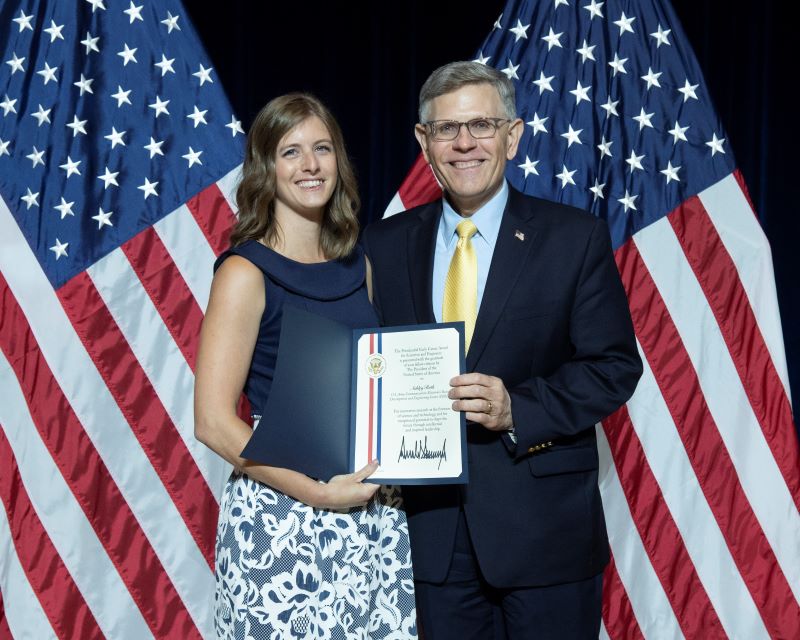
|
 |
Ashley Ruth received her award from Dr. Kelvin Droegemeier, Director of the White House Office of Science and Technology Policy; photo provided by Ruth. |
|
Ashley Ruth - who received her Ph.D. in Materials Science and Engineering (MSE) from the University of Maryland (UMD) in 2015 - is a recipient of the Presidential Early Career Award for Scientists and Engineers (PECASE) for 2019. Established in 1996, the PECASE is the highest honor offered by the U.S. government to outstanding scientists and engineers who show exceptional promise early in their careers.
“I’m truly honored to receive this award along with so many outstanding leaders in science and technology,” said Ruth. “I’m thrilled that I am able to perform this work for the U.S. Army where my contributions can benefit the Warfighter."
Ruth, a Maryland native, had always excelled at math and science, but was undecided when she was first accepted to UMD. As a high school student, she attended a few open houses on campus to explore her options. After watching MSE Professor Robert Briber’s demonstrations, she was hooked on materials science.
“Dr. Briber knocked it out of the park with the happy/sad balls, the magnet falling through a copper tube, and Nitinol paper clip demos,” Ruth said. “I knew MSE was right for me because I just had to find out why these materials behaved that way! I had originally enrolled in the 5 year BS/MS program, but at the 11th hour, decided to instead pursue my doctorate.”
As an undergraduate, advised by MSE Associate Professor Isabel Lloyd, Ruth conducted research on transparent armor, and learned quite a bit about ceramics and material characterization. She interned at the Army Research Laboratory (ARL) for three summers, and on Fridays while school was in session.
“I had an amazing mentor who took the time to teach me about ceramic processing, and exposed me to interesting characterization techniques even before I had taken many MSE classes!” said Ruth. “It certainly drove my interest to succeed academically.”
While in graduate school, Ruth worked for Eric Wachsman - a professor with joint appointments in MSE and ChBE who is also the Maryland Energy Innovation Institute Director - optimizing electrolyte and cathode materials for solid oxide fuel cells, which gave her plenty of opportunity to leverage her ceramic materials experience.
“I actually declined the NSF Fellowship in order to accept the SMART Scholarship, which allowed me to expand my research into battery materials for the U.S. Army Combat Capabilities Development Command (DEVCOM), C5ISR Center,” Ruth said. “Dr. Wachsman, as my advisor, helped me to ensure that work would be included in my thesis, and my mentor at C5ISR Center, Dr. Terrill Atwater, sat on my dissertation committee, too.”
Currently, Ruth serves as a chemical engineer in the Tactical Power Branch/Power Division at DEVCOM, developing optimized materials for rechargeable batteries.
“I pair this role in research with applied research for bringing the best battery technology to the Warfighter,” said Ruth. “Reliable portable power is critical to an effective mission and failure could put the Warfighter’s lives in danger – my experience at UMD was essential to my current work. I managed to engage with the correct people, at the correct time, and each experience gave me the background I needed to succeed at the next step. The University all but forces you to go out and find growth opportunities outside of the classroom. I was provided access to my internship, leadership opportunities, my sorority, clubs and recreational sports. My aperture of the world back in rural Baltimore County was pretty small – boy did Maryland really open it up for me!”
When asked to relay her most memorable moments on campus, Ruth said:
“I spent 9 years of my life at College Park – there are too many memories, too many individuals that had a lasting impact on me, to possibly do them all justice, but it was such a pivotal time of my life. The MSE Department was amazing. I felt a connection to every professor, Dr. [Kathleen] Hart, and all of my classmates. My Army mentors, Steve Kilczewski and Terrill Atwater, were also critical to my time as a student. And none of this would have been possible without the steadfast support of my husband, Steve – especially during qualifying exams when I essentially kicked him out of our apartment for 2 weeks!”
Although a subject matter expert in her field, Ruth admits she still has much to learn. Future topics of research she'd like to explore include component optimization for extended runtime, reduced weight, or increased rate capability, in addition to battery safety across various platforms.
To students considering an engineering major, Ruth said, "Get to know your professors, as well as your classmates - relationships are critical. You do very little by yourself, whether you believe it or not. Also, find a way to get relevant internship or co-op experience as soon as you possibly can. Eventually you will find your passion, and it really fuels your growth."
Related Articles:
How Will You Impact Society?
Alumna Blasts Into Space
Clark School of Engineering Professor Joseph Silverman Remembered
UMD Hosts 4th Annual Machine Learning Bootcamp and Workshop
MSE Hosts University Materials Council Spring 2019 Meeting
Marina Leite to Give a Plenary Talk at International Conference in Belgium
August 12, 2019
|